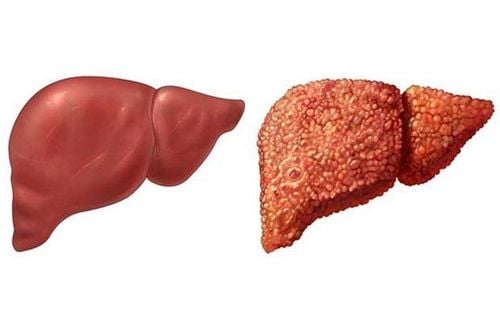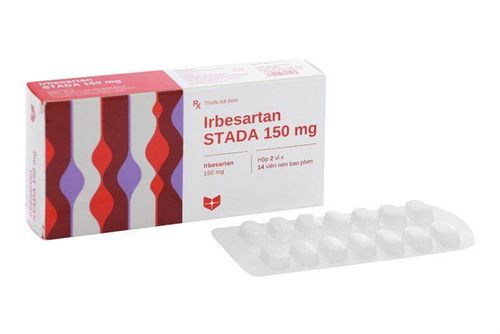This is an automatically translated article.
Moexipril is used to treat high blood pressure. Controlling blood pressure helps prevent strokes, heart attacks, and kidney problems that can occur in hypertensive patients. Moexipril belongs to the group of ACE inhibitors. It works by relaxing blood vessels so blood can flow more easily.
1. Indications and contraindications of Moexipril
Moexipril is contraindicated in the following cases:
Diabetic kidney disease High blood pressure Chronic heart failure Chronic kidney disease with albuminuria Moexipril is contraindicated in the following cases:
Low blood sodium level Dehydration High levels of potassium in the blood Decreased bone marrow function Low neutrophil levels Provide less oxygen-rich blood to the heart Aortic valve stenosis Renal artery stenosis Low blood pressure Liver failure Liver disease Decreased kidney function Excessive vomiting Excessive diarrhea Abnormal liver function tests Angioedema Pregnancy Cerebral blood flow problems Yellowing of the eyes or skin due to accumulation of bilirubin Intestinal angioedema
2. How to use Moexipril
Moexipril is taken by mouth about 1 hour before meals as directed by your doctor, usually once or twice daily. The dose of Moexipril is calculated based on your medical condition and response to treatment.
To reduce your risk of Moexipril side effects, your doctor may direct you to start this medicine at a low dose and gradually increase your dose.
Take Moexipril regularly to get the most benefit from it. To avoid forgetting to take your medication, take it at the same time(s) each day. Keep taking Moexipril even if you feel well.
It may take several weeks before you get the full benefit of Moexipril. Tell your doctor if your condition does not improve or gets worse (your blood pressure readings remain high or increase) after treatment with Moexipril.
Some lifestyle changes that can help Moexipril work better include exercising, stopping smoking, and eating a low cholesterol/low fat diet.
Tests such as kidney function, potassium levels should be done while you are taking Moexipril.
Check your blood pressure and pulse (heart rate) regularly while taking Moexipril. You need to learn how to check your blood pressure and pulse at home and share the test results with your doctor.

Thuốc Moexipril được sử dụng bằng đường uống vào khoảng 1 giờ trước bữa ăn theo chỉ dẫn của bác sĩ
3. Side effects of Moexipril
While using Moexipril you may feel dizzy, lightheaded or tired which may occur when your body has not adapted to the medicine. A dry cough may also occur when you use this medicine. If any of these side effects persist or get worse, tell your doctor right away.
To reduce the risk of dizziness and lightheadedness while using Moexipril, get up slowly when getting up from a sitting or lying position.
Remember that your doctor has prescribed this medicine for you because they have judged that the benefit to you is greater than the risk of side effects. Many people use Moexipril and no serious side effects occur.
Tell your doctor right away if any of these serious side effects of Moexipril occur, including: Symptoms of high blood potassium levels (such as muscle weakness, heartbeat) slow/irregular), fainting.
Moexipril can be used to prevent kidney problems or treat people with kidney problems, but it can also cause kidney problems or make them worse, although this rarely happens. Your doctor will check your kidney function while you are taking Moexipril. Tell your doctor right away if you have any signs of kidney problems such as a change in the amount of urine.
Moexipril can rarely cause liver disease so severe that it can be fatal. Get medical help right away if you have any symptoms of liver damage while using Moexipril, such as: Nausea/vomiting that doesn't stop, loss of appetite, stomach/abdominal pain, yellowing eyes or skin , dark urine.
A very serious allergic reaction to Moexipril is very rare. However, if you notice any symptoms of a serious allergic reaction to Moexipril, including: Hives, itching/swelling (especially of the face/tongue/throat), trouble breathing, severe dizziness important, get medical help right away.
Below are Moexipril side effects by likelihood.
Common side effects of Moexipril include:
Dizziness Temporary redness of the face and neck Cough Uncommon side effects of Moexipril include:
High blood potassium Rash on the skin Sore throat Common cold Nasal congestion and runny nose Inflammation of the lining of the sinuses Dry mouth Indigestion Skin increased sensitivity to sunlight Itching Hair loss Muscle pain Low energy Flu-like symptoms Pain Loss of taste Headache Heart pounding Nausea Illness Diarrhea Rare side effects of Moexipril include:
Hemolytic anemia Very low granulocyte count Low neutrophil level Low blood pressure Vocal cord swelling Pneumonia with high eosinophil count. Bronchospasm Liver damage Acute pancreatitis Acute renal failure Pemphigus, a skin disorder. Fainting Water retention in the hands and feet. Shortness of breath Chest pain Abnormal liver function tests Anaphylaxis Angioedema Intestinal angioedema Head and neck angioedema Mood changes Ringing in the ears Drowsiness Excessive sweating Increased need to urinate often Anxiety feelings This is not a complete list of possible side effects of Moexipril. If you notice other side effects of Moexipril not listed above, contact your doctor immediately.
4. Measures to prevent side effects of the drug Moexipril
Before taking moexipril, tell your doctor if you are allergic to this medicine or to other ACE inhibitors (such as captopril, lisinopril) and to any other allergies, if any. Moexipril products may contain inactive ingredients that may cause allergic reactions or other problems.
Before using Moexipril, tell your doctor your medical history, especially of: History of allergic reactions including swelling of the face/lips/tongue/throat (angioedema), dialysis measures used (such as LDL dialysis, dialysis), high blood potassium, liver disease.
Moexipril can make you dizzy and alcohol and marijuana can make you more dizzy. Do not drive, use machines, or do anything that requires alertness while using Moexipril, until you can do so safely.
Excessive sweating, diarrhea, or vomiting can cause your body to lose too much water and increase the risk of dizziness while using Moexipril. Report persistent diarrhea or vomiting to your doctor. You need to drink enough water to prevent dehydration unless your doctor directs you otherwise.
Moexipril can increase your potassium levels. Before using potassium supplements or salt substitutes containing potassium, consult your physician.
Before surgery, tell your doctor or dentist that you are being treated with Moexipril.
Older adults may be more sensitive to the side effects of Moexipril, especially dizziness and high potassium levels.
Moexipril is not recommended for women during pregnancy, because it can harm the unborn baby. Currently, it is not known whether moexipril passes into breast milk. Women who are breastfeeding should consult their doctor before using this medicine.

Trước khi sử dụng thuốc Moexipril, hãy cho bác sĩ biết nếu bạn có tiền sử bệnh gan
5. Moexipril drug interactions
Drug interactions can change the way Moexipril works or increase your risk of serious side effects. Tell your doctor about all the medicines you use, including prescription/nonprescription drugs and herbal products. Do not start, stop, or change the dose of any medicine while using Moexipril, without your doctor's approval.
Some products that may interact with Moexipril drugs include: Aliskiren, lithium, sacubitril, certain drugs that weaken the immune system/increase the risk of infection (such as everolimus, sirolimus), which can make increased levels of potassium in the blood (such as ARBs including losartan/valsartan, birth control pills containing drospirenone).
A very serious reaction can occur if you are receiving an injection for wasp/ wasp allergy (desensitization) and are also taking moexipril. Make sure all your doctors know you are using Moexipril.
6. What to do if you overdose or forget to take Moexipril?
If you or someone else has overdosed on Moexipril and has severe symptoms such as fainting or difficulty breathing, call 911 immediately. Symptoms of a Moexipril overdose may include: Unusually fast or slow heartbeat, severe dizziness, or fainting.
If you miss a dose of Moexipril, take it as soon as you remember. If you remember when it is almost time for your next dose, skip the missed dose. Use your next dose of Moexipril at the usual time, do not double the usual dose.
7. How to store Moexipril
Store Moexipril at room temperature, away from light and moisture, do not store in the bathroom, keep the medicine away from children and pets. Dispose of this medication appropriately when it has expired or is no longer needed by you.
Please dial HOTLINE for more information or register for an appointment HERE. Download MyVinmec app to make appointments faster and to manage your bookings easily.
Reference source: webmd.com













